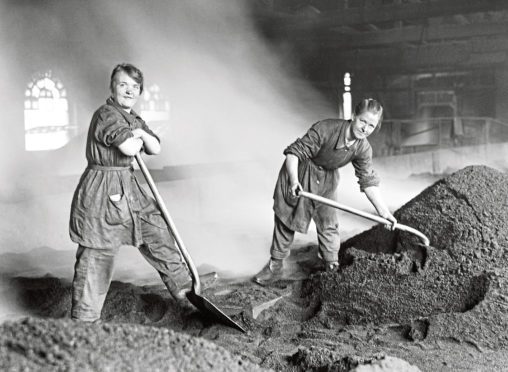The north and north-east was almost entirely spared any direct physical damage – beyond an “extraordinary and disgraceful” U-boat shelling that damaged St Kilda’s church and a rogue raid by a possibly lost Zeppelin which left craters in an Insch field and shattered several windows of a nearby castle.
Constant drills of training troops wore bare the turf of Aberdeen’s Links as more and more reinforcements were prepared for the front, and an isolated friendly-fire incident saw a shell from a merchant ship once whistle over Torry.
But the war wrought many significant changes on society as it was known in 1914.
If the region’s harbours were untouched by enemy fire for example, they were left unrecognisable in other ways.
Many were the familiar fishing boats from the height of the herring industry, converted to mine sweeping and patrol duties, that left port never to be seen again.
The Sailors’ Home registers from the time show thousands made shipless by military action finding shelter there – and that was just those who made it back.
With so many men sent off to fight on land, sea and air, another very visible change was in female employment.
“Women run our tramcars, deliver our letters, check our tickets on the railways and clean the trains,” this newspaper recorded at the time.
“They have taken the place of our bank clerks, and serve behind the counters where in pre-war days men only were employed; they drive the vans on the streets; and they swarm in the workshops making the munitions of war and the aeroplanes that have done so much in bringing the victory.”
That work was among the most important spurs towards all women eventually getting the vote.
Some trades all but disappeared over the four years – the Granite trade so synonymous with Aberdeen being one which ground to a halt.
“Nowhere is the change more apparent at a glance than in the huge yard of the Granite Association in Urquhart Road,” it was noted.
“Gone are the huge piles of granite blocks, imports from Scandinavia, and the ground is bare and the many cranes stand idle, like straddling skeletons forgotten in the stress and hurry of war.”
It would take a long time for Britain fully to get back on its feet.
Coal and food were rationed – and would remain so for some time after the end of hostilities.
As the troops gradually returned to their homes, another awkward social issue had to be addressed in Inverness.
Large numbers of Americans had been sent to the Highland Capital in 1917 to work on the ambitious Northern Barrage project to place a line of mines all the way from Orkney to Norway.
Working out of the converted Glen Albyn distillery they quickly established good relations and became a popular feature – even sparking a sudden interest in baseball.
Perhaps those relations were too good though, at least for some returning husbands, with reports there was something of a riot and the US sailors ended up confined to barracks.
